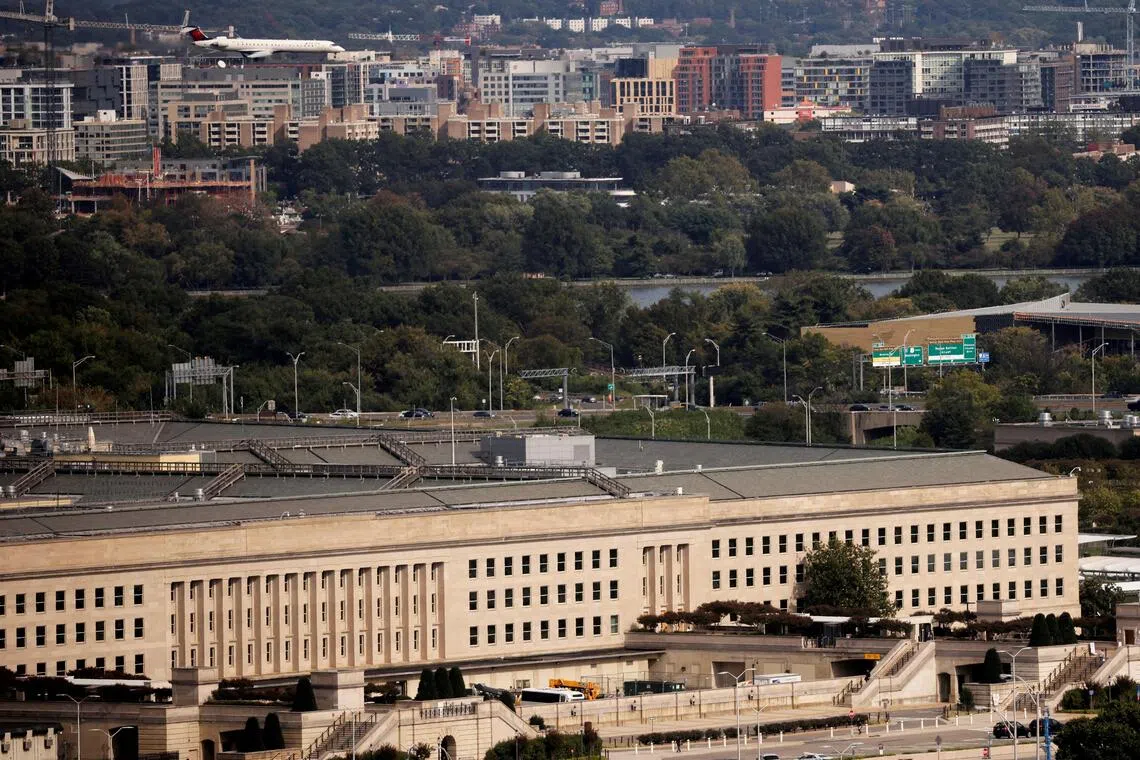Pentagon expands its restrictions on reporter access
Sign up now: Get ST's newsletters delivered to your inbox

A 17-page memo, circulated to the press on Sept 19, also constrains movements within the Pentagon itself.
PHOTO: REUTERS
- The Pentagon is implementing new restrictions on journalists, requiring them to pledge not to gather or use unauthorised information or risk losing credentials.
- The new rules limit access within the Pentagon and define off-limits information broadly, including both classified and "controlled unclassified information".
- Media groups condemn the policy as a "direct assault on independent journalism" and a violation of the First Amendment, potentially restricting the flow of information.
AI generated
WASHINGTON – The Pentagon said on Sept 19 it would impose new restrictions on reporters covering the Department of Defence, requiring them to pledge not to gather or use any information that had not been formally authorised for release or risk losing their credentials to cover the military.
The new mandate, described in a memorandum circulated to the press on Sept 19, was the latest in a series of actions by the Trump administration to limit the ability of the media to cover the federal government without interference.
The Department of Defence said in the 17-page memo that it “remains committed to transparency to promote accountability and public trust”.
But it added that “information must be approved for public release by an appropriate authorising official before it is released, even if it is unclassified”.
In addition, the document constrains the movements of the media within the Pentagon itself, designating large areas of the building off-limits without escorts for the roughly 90 reporters credentialled to cover the agency.
Although many offices and meeting rooms in the Pentagon are restricted, the Pentagon press corps had previously been given unescorted access throughout much of the building and its hallways.
The move could drastically restrict the flow of information about the US military to the public.
The National Press Club called the policy “a direct assault on independent journalism” and called for it to be immediately rescinded.
Mr Sean Parnell, the chief Pentagon spokesman, said in a statement that the guidelines were “already in line with every other military base in the country”, adding that they were “basic, common-sense guidelines to protect sensitive information”.
The Pentagon’s tense relationship with the news media reflects a pervasive attitude throughout the Trump administration.
The White House has repeatedly limited access to outlets because of coverage it does not like, and US President Donald Trump has sued multiple news organisations, including The Wall Street Journal and The New York Times, over their coverage.
Following the assassination of conservative activist Charlie Kirk last week, the head of the Federal Communications Commission, Mr Brendan Carr, threatened television stations with “fines or licence revocation” if they continued carrying Jimmy Kimmel’s late-night show on ABC.
This comes after the comedian made comments that some interpreted as critical
The Defence Department has been a focal point of press scrutiny in 2025, with media outlets revealing that Defence Secretary Pete Hegseth had disclosed classified war plans in a private group chat that included a reporter and that the secretary had invited billionaire Elon Musk to a briefing on the government’s top-secret plans if war broke out with China.
Recently, news coverage has raised questions about the legality of two military strikes on Venezuelan boats that killed 14 people.
On Sept 19, Mr Trump said a third Venezuelan boat had been destroyed by the government, with three additional people killed.
Under the watch of Mr Hegseth, the Pentagon has placed a series of restraints on the news media’s ability to cover the military
Mr Hegseth, a former Fox News host, has taken an increasingly adversarial position with the press, repeatedly accusing journalists of attempting to “sabotage” Mr Trump’s agenda by publishing information leaked by “disgruntled former employees”.
He has held only one press briefing, after a military strike on Iran in June.
“The ‘press’ does not run the Pentagon – the people do,” Mr Hegseth wrote on Sept 19 in a post on X.
Mr Trump, for his part, suggested to reporters on Sept 18 that news outlets should be punished for negative coverage of his presidency
“They give me only bad publicity or press,” he said. “I mean, they’re getting a licence, I would think maybe their licence should be taken away.”
Mr Parnell did not respond to a query about why the guidelines were issued now or whether the White House was involved in the decision to implement them.
The White House did not immediately respond to a request for comment on the development.
The new pledge asks journalists to acknowledge in writing that acquiring or using unauthorised information would be grounds for “immediate suspension” of Pentagon access.
It defined off-limits information to include both classified materials and “controlled unclassified information”, a broadly defined category that includes materials that could pose a risk to national security if released to the public.
It is not clear whether the prohibition would include soliciting information from Defence Department staff or seeking confirmation or comment on materials gathered through other means.
The Pentagon Press Association said in a statement that it was “aware of today’s new directive regarding badge access to the Pentagon and is reviewing it”.
Mr Seth Stern, director of advocacy at Freedom of the Press Foundation, said the government is legally prohibited from requiring journalists to surrender their right to investigate the government in exchange for access or credentials.
“This policy operates as a prior restraint on publication which is considered the most serious of First Amendment violations,” Mr Stern said.
“The government cannot prohibit journalists from public information merely by claiming it’s a secret or even a national security threat.” NYTIMES


